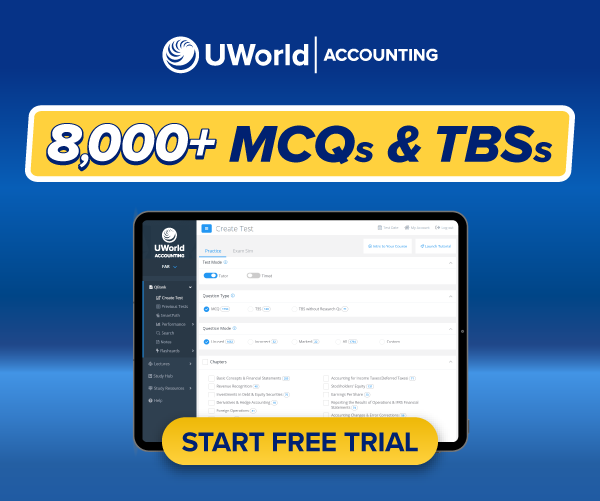The CPA Exam is considered one of the most challenging professional credential tests with a pass rate of 50%. Mastering the exam demands rigid studying, effective time management, and focused effort to conquer the extensive syllabus and complex topics.
Why Do You Need a Study Plan?
Creating a detailed study plan will keep you organized, ensure you cover all the high-yield material in a timely manner, and allow you ample time to focus on weaker areas.
- Manage Your Time: Schedule exactly when you will review each topic to be more efficient and effective. You can allocate more time to complex chapters that need extra attention and reduce last-minute cramming. Proper planning allows you to dive right into your studies and ensures you stay organized and on track.
- Set Realistic Goals: Since you need to cover a huge amount of syllabus material in a relatively short period, break the syllabus down and set small goals for each topic. Creating manageable goals will keep you motivated and allow you to finish the syllabus in the allocated time.
- Track Your Progress: When you have a study plan with a timeline, you can easily track what topics you have completed, how many remain, and which ones need a little more time and attention. This ensures you stay on track and are fully ready to take the CPA Exam.
- Reduce Procrastination: Procrastination is a big enemy if you’re juggling life, a job, and studying. Monitoring your progress will increase accountability and serve as a reminder that you don’t have time to delay studying.
- Find Work-Life Balance: Maintaining a study plan can improve your work-life balance. This prevents burnout and promotes consistent progress.
How UWorld’s Dynamic Study Planner Can Help
With an estimated 350-450 study hours recommended to prepare for the CPA Exam, making a study plan will help you stay on course, prioritize your goals, and balance the demands of work and life. Let UWorld’s CPA Dynamic Study Planner simplify this process so you can focus on studying rather than planning. Our tool offers:
- Customized Study Plan: Customizing a study planner typically takes a significant amount of time. But with our dynamic study planner, you can do it in minutes. Simply enter a start and end date along with your preferred study hours and our algorithm will create a detailed study plan with daily tasks.
- Smart Tracking: Every minute you spend studying or taking practice tests is important, so make them count. Our study planner allows you to schedule focus sessions and track your progress checkpoints. If you miss a task or day, the calendar will adapt and not just move tasks from one day to another.
- Easy Accessibility: Whether you're at home, working in the office, or commuting, you can access the study planner anytime, from any device, ensuring hassle-free learning at your convenience.
- Daily Practice: The planner creates personalized practice tests and tasks taking into account your progress and study needs. It uses your QBank content to adapt to your strengths and weaknesses to ensure efficient and effective learning.
Don’t forget to take time for self-care along your CPA Exam studying journey. It’s just as important to get ample sleep and take breaks as it is to focus on topic areas where you need more practice.



